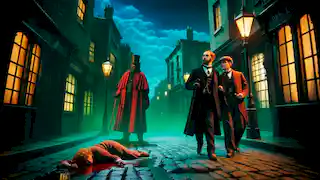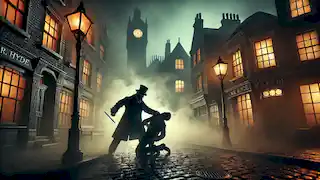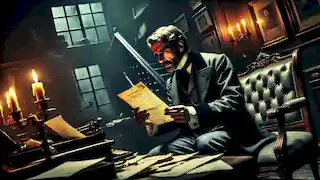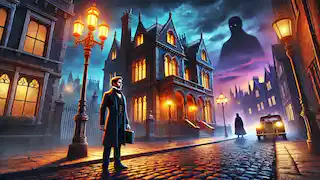The strange case of Dr. Jekyll and Mr. Hyde is a story of a man’s struggle between his dual nature of good and evil. Written by Robert Louis Stevenson, it explores the concepts of identity, morality, and the hidden darkness within the human soul. Dr. Henry Jekyll, a respected scientist, believes that within every person exists two opposing forces—good and evil. His curiosity about these forces leads him down a dangerous path as he creates a potion that allows him to separate his better self from his darker side. This separation manifests in the form of Mr. Edward Hyde, a cruel, villainous figure who represents the unleashed evil in Dr. Jekyll's heart. In the late 19th century, London was a bustling city filled with intrigue and innovation, yet it also harbored dark corners where mystery and secrets lurked. It is in this setting that the tale of Dr. Jekyll and Mr. Hyde begins. The story opens with Mr. Gabriel John Utterson, a lawyer, and friend of Dr. Jekyll, who notices a disturbing event involving a man named Edward Hyde. Utterson is walking with his cousin, Mr. Enfield, when the two witness Hyde brutally trampling a young girl in the street. Enfield describes the man as “somehow deformed” and “detestable,” but he can’t put his finger on exactly why Hyde elicits such strong feelings of disgust. The girl’s family demands reparation, and Hyde agrees to pay them, entering a nearby building to retrieve a check. Much to Enfield’s surprise, the check is signed by Dr. Henry Jekyll, a well-known and respectable figure in society. Utterson is deeply troubled by this revelation. Why would Dr. Jekyll be associated with a man as vile as Hyde? His concern grows as he remembers that Dr. Jekyll recently altered his will, leaving everything to Mr. Hyde in the event of his death or disappearance. As a close friend of Jekyll’s, Utterson resolves to investigate further, hoping to uncover the truth behind Jekyll’s strange connection to Hyde. Utterson visits Dr. Jekyll at his home, a grand and respectable house on a fashionable street in London. He hopes to discuss the matter of Hyde, but Jekyll brushes off his concerns, assuring Utterson that everything is under control. Jekyll admits that he has taken a "great interest" in Hyde, but refuses to explain further. He begs Utterson to drop the subject, stating that he can handle the situation himself. However, Utterson cannot shake the uneasy feeling that something is terribly wrong. As the months pass, Hyde’s violent behavior escalates. He is reported to have attacked several people and committed heinous acts across the city. Despite these crimes, he continues to elude capture. Utterson’s fears for his friend grow as he suspects that Hyde is somehow blackmailing Jekyll, controlling the once kind and generous doctor with dark secrets. Then, suddenly, Hyde disappears. For weeks, there is no sign of him, and London breathes a sigh of relief. During this time, Jekyll becomes more social and returns to his old, friendly self. He hosts dinners for his friends and appears to be in good spirits. But Utterson remains wary, sensing that this newfound calm cannot last. One night, a horrific crime shocks London to its core. Sir Danvers Carew, a respected member of Parliament, is found brutally murdered in the street. The only witness to the crime is a maid who saw the assailant from her window. She describes the killer as a man of small stature with a savage temper—a man she identifies as Edward Hyde. The police launch a manhunt for Hyde, but once again, he vanishes without a trace. Utterson is called to the scene of the crime because a letter addressed to him is found on Carew's body. It is from Dr. Jekyll. Fearing the worst, Utterson visits Jekyll, who looks pale and ill. Jekyll assures Utterson that Hyde will never be seen again, and he hands over a letter, purportedly written by Hyde, in which Hyde declares his intention to disappear for good. Utterson takes the letter to a handwriting expert, who notes that the writing bears a striking resemblance to Jekyll’s own handwriting. Utterson is horrified by the implications—could Jekyll and Hyde be the same person? He decides to confront his friend once and for all, determined to uncover the truth behind this bizarre mystery. Utterson goes to Jekyll’s home but finds that the doctor has secluded himself in his laboratory, refusing to see anyone. Jekyll’s servants report strange behavior from their master—he has become increasingly reclusive and erratic, spending long hours locked in his laboratory. They are concerned but dare not question him. Weeks go by, and Utterson receives a frantic letter from Dr. Jekyll’s butler, Mr. Poole, begging him to come to the house immediately. When Utterson arrives, he finds the household in a state of chaos. Poole reports that something is terribly wrong with Dr. Jekyll, who has been acting even more strangely than usual. Poole fears that the doctor may have been murdered and that an imposter is now living in the house. Utterson and Poole break down the door to the laboratory, only to discover Hyde’s body lying on the floor. He appears to have taken his own life. But where is Dr. Jekyll? Utterson searches the room and finds a letter addressed to him. In the letter, Jekyll explains everything. In his confession, Dr. Jekyll reveals the terrible truth: he and Hyde are, in fact, the same person. Jekyll had always believed that there were two sides to his personality—the moral, upright side and the darker, more sinister side. He theorized that by creating a potion, he could separate these two identities, allowing him to live as both the respected Dr. Jekyll and the free, uninhibited Mr. Hyde. At first, Jekyll reveled in the freedom that Hyde provided. Hyde could commit any crime, indulge in any vice, without fear of repercussion. But as time went on, Hyde’s personality grew stronger and more malevolent. Jekyll found himself losing control of the transformation—Hyde began to appear without the use of the potion, and Jekyll feared that he would soon be unable to return to his original self. Jekyll describes the torment of living with the constant threat of turning into Hyde. He writes of his regret and despair, knowing that he has unleashed a monster upon the world. The murder of Sir Danvers Carew was the final straw. After that, Jekyll resolved to end his life, knowing that it was the only way to stop Hyde forever. In his final words, Jekyll expresses deep remorse for his actions and the suffering they caused. He acknowledges that he allowed his curiosity and pride to lead him down a dangerous path, and he hopes that others will learn from his tragic story. The tragic tale of Dr. Jekyll and Mr. Hyde serves as a cautionary story about the dangers of tampering with the human soul. In his pursuit of scientific knowledge and personal freedom, Dr. Jekyll unleashes the darkness within himself, with devastating consequences. Stevenson’s classic novel remains a powerful exploration of the duality of human nature, showing how easily the line between good and evil can be blurred. The story of Dr. Jekyll and Mr. Hyde continues to resonate with readers today, reminding us of the importance of self-awareness and the consequences of losing control over our darker impulses.Story Begins

The Mystery Deepens
The Murder of Sir Danvers Carew

The Truth Revealed

Dr. Jekyll’s Confession

Conclusion
Dr. Jekyll and Mr. Hyde
Reading Time: 7 min

About Story: Dr. Jekyll and Mr. Hyde is a Realistic Fiction Stories from united-kingdom set in the 19th Century Stories. This Dramatic Stories tale explores themes of Good vs. Evil Stories and is suitable for Adults Stories. It offers Moral Stories insights. A dark exploration of human duality and the battle between good and evil.
















